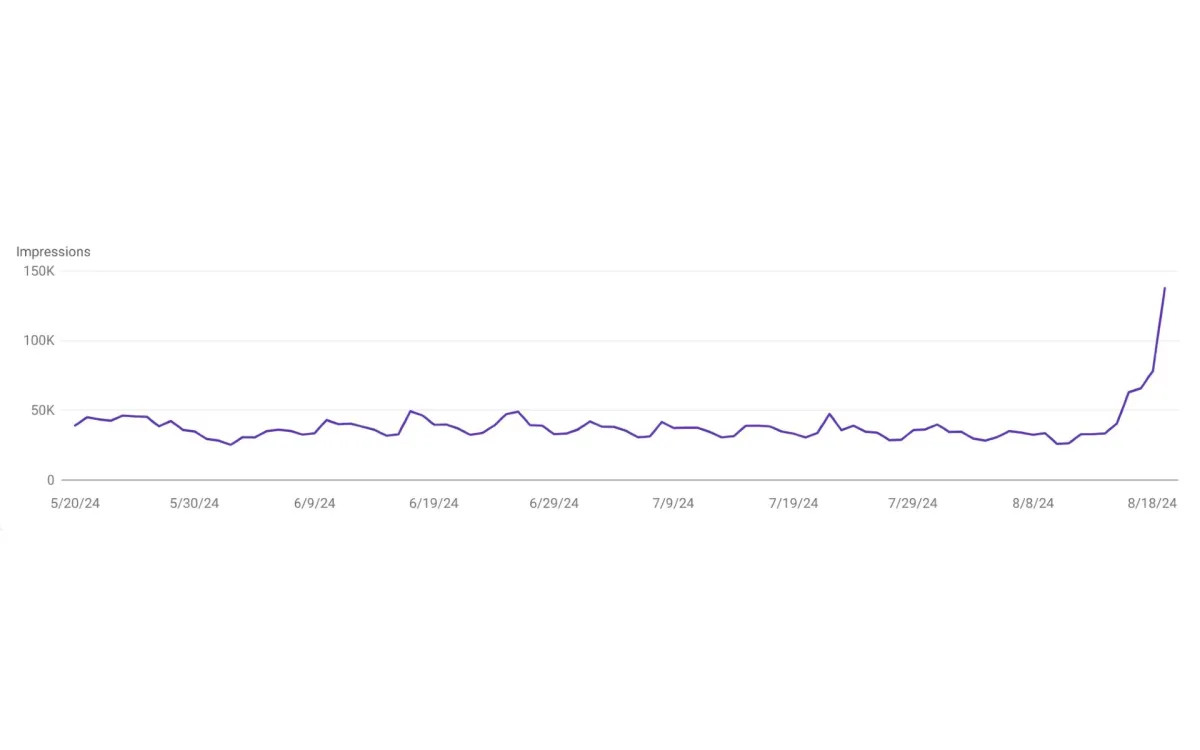
Julien Brault, CEO of the financial technology startup Hardbacon, yesterday shared a LinkedIn post detailing an unexpected turn of events following the company's bankruptcy announcement. This development comes just one week after Hardbacon publicly disclosed its decision to cease operations due to a prolonged period of declining web traffic attributed to Google algorithm updates.
According to Brault's post, Hardbacon announced the cessation of its operations and impending bankruptcy on Thursday, August 15, 2024. This decision was made after the company had experienced a significant loss in web traffic from Google over the past 11 months, which had rendered the business model unviable.
However, in a surprising twist, Brault reported that Google launched a new algorithm update the very next day, on Friday, August 16. Unlike previous updates since September 2023, which had consistently resulted in decreased traffic for Hardbacon, this latest change had a dramatically positive effect. Brault stated that within just four days of the update, Hardbacon's traffic from Google had quadrupled, and appeared to be doubling each subsequent day.
This sudden reversal of fortune presents a complex situation for Hardbacon and its stakeholders. Brault expressed skepticism about the company's ability to capitalize on this traffic resurgence, citing two main factors. Firstly, he noted that given Hardbacon's current financial situation, the traffic increase might be "too little, too late" to save the company. Secondly, Brault questioned his own capacity to rebuild the business after 11 months of progressively dismantling it and facing daily setbacks.
The CEO's post provides insight into the emotional and psychological toll of managing a company through such turbulent circumstances. Brault described the process of "dismantling my business piece by piece" over the past 11 months, highlighting the cumulative effect of prolonged adversity on entrepreneurial resilience.
Brault's statement that it took Google 11 months to correct what he perceives as an "error" made in September 2023 underscores the frustration felt by many digital businesses affected by algorithm changes. He emphasized that the damage extends beyond Hardbacon to "thousands of companies that depended on Google," illustrating the far-reaching impact of search engine algorithm updates on the digital economy.
Despite the recent traffic increase, Brault indicated that he is still required to officially file for bankruptcy by Friday, August 23. This suggests that the legal and financial processes set in motion by the company's earlier decision are not easily reversed, even in light of improved traffic numbers.
Adding another layer of complexity to the situation, Brault revealed that approximately twenty credible buyers have expressed interest in purchasing Hardbacon's assets from the bankruptcy trustee. This interest from potential buyers indicates that while Hardbacon as a company may cease to exist in its current form, its technology, content, and user base hold significant value in the market.
Brault expressed mixed feelings about this prospect, describing the potential sale of Hardbacon's assets at a "ridiculously low price" as "heartbreaking." He voiced concern that those who acquire the company's assets through the bankruptcy process could profit significantly, effectively capitalizing on the years of work and investment made by Brault and Hardbacon's 2,000 investors.
This latest development in Hardbacon's story highlights the volatile nature of businesses heavily dependent on search engine traffic. It underscores the potential for rapid and significant changes in a company's fortunes based on alterations to search algorithms, which are largely outside of a business's control.
The case of Hardbacon raises several important questions about the digital economy:
- How can businesses protect themselves against sudden changes in search engine algorithms?
- What responsibilities, if any, do search engines have to the businesses that rely on them for traffic?
- How can the impact of algorithm changes be balanced against the need for search engines to improve their services?
- What are the implications for market competition when a single company's algorithm changes can so profoundly affect thousands of businesses?
As the situation continues to unfold, it remains to be seen whether the recent traffic surge will have any impact on Hardbacon's fate, or if it will simply serve as a poignant footnote in the company's history.
Key facts from Julien Brault's LinkedIn post
- Hardbacon announced cessation of operations and impending bankruptcy on August 15, 2024
- Google launched a new algorithm update on August 16, 2024
- The update quadrupled Hardbacon's Google traffic within 4 days
- Traffic appears to be doubling each day following the update
- Brault must officially file for bankruptcy by August 23, 2024
- Approximately 20 credible buyers have expressed interest in purchasing Hardbacon's assets
- Hardbacon has 2,000 investors who stand to lose their investments
- The company experienced 11 months of declining traffic prior to this recent update
- Brault expressed doubt about his ability to rebuild the company despite the traffic increase

